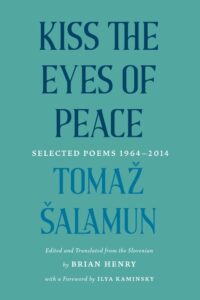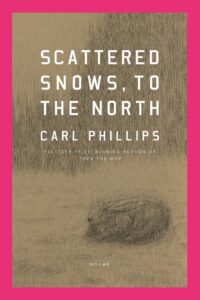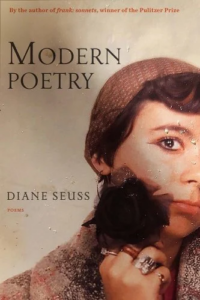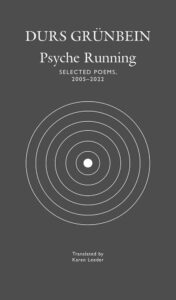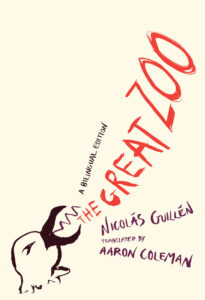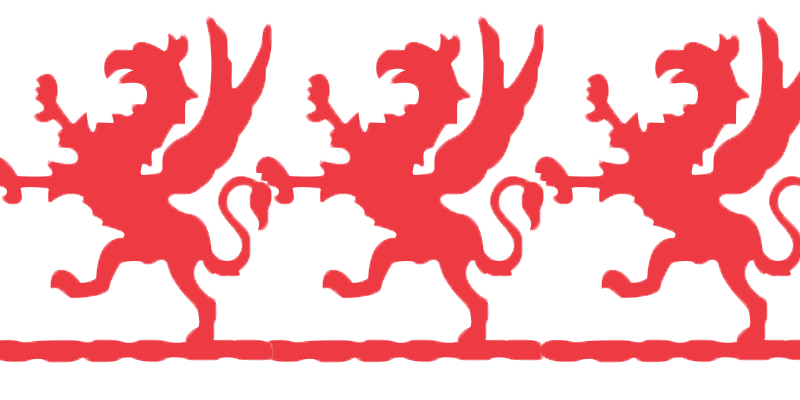
Meet the 2025 Griffin Poetry Prize finalists.
Last month, the Griffin Poetry Prize—the world’s largest international prize for a single book of poetry published in English—announced its 2025 shortlist. The winner will be announced at a ceremony in Toronto on June 4th, and will receive C$130,000. Each other shortlisted poet will be awarded $10,000.
In advance of the ceremony, Literary Hub caught up with some of the shortlisted poets and translators to find out a little bit about their reading and writing lives.
Brian Henry, translator of Tomaž Šalamun’s Kiss the Eyes of Peace
What book has elicited the most intense emotional reaction from you (made you laugh, cry, be angry)?
Donna Tartt’s The Goldfinch immediately comes to mind. It’s hard to describe the effect it had on me: I felt so alive while reading it, overwhelmed with different emotions, not just from what was happening in the novel, but also from Tartt’s skill and that feeling of knowing a book you don’t want to end has to end. I also adore the emotional effect of novels like The Remains of the Day, The Go-Between, and Lie With Me.
Which book(s) do you reread?
I’m always rereading poems and books of poems, so that would be a really long list. For prose, I often go back to Walter Benjamin’s Berlin Childhood Around 1900 and One-Way Street, Jennifer Moxley’s There Are Things We Live Among, Fernando Pessoa’s The Book of Disquiet, Rosa Liksom’s Compartment No. 6, and a few different books by David Markson and Thomas Bernhard.
What was the first book you fell in love with (why)?
Piggle by Crosby Bonsall. When I was a kid, I liked that she confronted how mean children could be to each other. In addition to the mayhem, Piggle also had fun wordplay.
How do you decide what to read next?
I keep new books in different places—on my desk and on a table at work, on my nightstand, on my desk at home, on a specific bookshelf, on a side table—so that I always have a new (or at least unread) book in reach. There isn’t much of a method, except I tend to keep novels together in order to avoid having two novels going at the same time.
What’s one book you wish you had read when you were young?
The Catcher in the Rye. I didn’t read it until I was 31, when I was asked to write an encyclopedia article on J.D. Salinger. I liked the book, but I know it would have affected me more if I’d read it as a teenager. I felt like I’d missed out on something.
Carl Phillips, author of Scattered Snows, to the North
Who do you most wish would read this book?
Maybe my younger, differently confused self – it might have made me realize that people never stop asking questions about who they are or should be or might be – and that it’s okay not to know the answers. On the other hand, if I’d known that, I might not have written my poems in the first place…
What part of your writing routine do you think would surprise your readers?
That I don’t have a writing routine at all, unless you count dinner prep, walking a dog, and reading for several hours every night.
Which non-literary piece of culture – film, tv show, painting, song – could you not imagine your life without?
Pop, indie, and alternative music.
Which book(s) do you reread?
So many of them! I reread all the novels of Barbara Pym every year. Linda Gregg’s first book of poems, To Bright to See. I love Bright Moon, Perching Bird, a translation of the poems of Li Po and Tu Fu by J.P. Seaton and James Cryer. Middlemarch. I’ve read War and Peace twice, and I’m thinking of trying that again…
If you weren’t a writer, what would you do instead?
Top choice: to be the lead singer in a band. Second choice, to be a backup singer for Sade.
Diane Seuss, author of Modern Poetry
Who do you most wish would read this book?
I dedicated Modern Poetry to my reader, and I meant that. There is a bond between the writer and the individual reader who dedicates their time and imagination to the reading of a book of poems. I wish one of those readers could be my father, who died when I was seven. I didn’t have the time to know him beyond how it felt to be with him, so I’m not sure if he would have been a reader of poetry, given the chance. Of course, had he lived, this would be a very different book, or would not exist at all.
How do you tackle writer’s block?
If I feel lost or generally low energy in my creative life, I set an assignment for myself, usually hinged upon writing into my weaknesses and in opposition to my habits. For instance, if I’ve been writing longer narrative poems, I’ll assign myself short poems that are centered in music or write several poems in a compressive traditional form. If I’ve become habitual in using “I,” I’ll commit to a sequence using “we.” I’m currently brewing up an assignment that will disallow the music-heavy poems I’ve been writing in the last year. Basically, knock yourself off course. Do what you haven’t yet done or have thus far refused to do.
Which non-literary piece of culture—film, tv show, painting, song—could you not imagine your life without?
Right now, music—song—is crucial to keeping me emotionally and spiritually alive. Music is so potent that I can barely listen to it. It resurrects on a cellular level. Music awakens in me what I believed was long dead—the feeling of romantic love, for instance, and the thunderous nature of grief. Whimsy. Hilarity. Even hope. Little Feat’s “Willin.’” Lead Belly’s version of “In the Pines.” Billy Strayhorn’s “Lush Life.” The B-52’s “Dance this Mess Around.” Ronee Blakely’s “Dues.” Patti Smith’s “Pissin’ in the River.” Nick Cave and P.J. Harvey’s “Henry Lee,” and Nick Cave’s wonderfully obscene version of “Stagger Lee.”
What was the first book you fell in love with (why)?
My answer to this question changes as I change. Right now, I’d say the horse books by Marguerite Henry. I think Misty of Chincoteague was the first one I read. It’s hard to explain, isn’t it, the immersion experience of a first beloved book. I wanted a horse, and knew I would never have one, but somehow the book was bigger than owning a horse, bigger than owning anything. In that sense, a book is anti-capitalist, especially if you borrow it from the library.
What do you always want to talk about in interviews but never get to?
Probably the nature of the place where I was raised. It was a strange, numinous time, place, and situation. Hallucinatory, yet concrete. The details bloomed into images I’ve carried with me through my long writing life. The village cemetery next door to our little gray rental house, the lane to the graves lined with pines, and leading, of all places, to Babyland, where infants were interred, and off to the north, built into a woodsy hillside, a cave for storing dead bodies in winter, when a shovel couldn’t break the frozen ground. Just past the border of rhubarb and black raspberries, the cement block Church of God, to which I wandered on Sunday mornings and where I was uselessly saved seven times before I was four years old. The rusty horse-shaped swings at the base of the blank screen at the outdoor movie theater. The compelling lack of television. Lack in all its guises and disguises.
Karen Leeder, translator of Durs Grünbein’s Psyche Running
Who is the person, or what is the place or practice that had the most significant impact on your literary education?
When I was thirteen and set to pursue Maths and Physics and become an astronaut or an engineer, I encountered the German teacher Mr David. He was new in the rather conservative British girls’ grammar school. He wore his slick black hair in a fringe over one eye (Hitler-style, it seemed to me) and would march into the room, slam his briefcase down onto the desk, sweeping the room with a stare, and intoning ‘So!’, as we all lumbered to our feet. He was terrifying and hilarious in equal measure. That was it: German it had to be. And with that the course of my life changed. Even when later it was clear I would go on to study literature rather than physics, that encounter meant that it was German literature, a whole different tradition, different voices: Goethe, Büchner, Rilke, Brecht, Celan, Bachmann.
What was the first book you fell in love with (why)?
I grew up without literary books around me at home. There was a tiny 3-shelf book case with my father’s rocket books, a little book for spotting birds and another for flowers, and the first (free) part of a set of encyclopaedias: ‘From Abbey to Arab’. But there was one book, I am not sure where it came from, The Oxford Book of English Verse: 1250-1900, a dark blue hard back with gilt lettering, published in 1915 and edited by the man with the resonant name: Arthur Quiller-Couch. That book I pored over, learning poems by heart, hearing so many strange voices, not understanding many things. It seemed a missive from another world. Later of course I found my way to the local library and everything changed, but those poems, those rhythms, have stayed with me.
How do you tackle writer’s block?
Translation is very good for writer’s block. At times when the deadline or the blank page is crippling and I cannot write in my own voice, either creatively or critically, it offers a way through. To translate is to use the some of the same energies and strategies, but always with a readymade starting point and end goal in sight. There are already words on the page, the fear is less. Sometimes the results are not worth very much, but sometimes they go off to all kinds of new places. And the motor has been started.
What’s the best or worst writing advice you’ve ever received?
Read the text out loud. For poetry its essential.
Which book(s) do you reread?
For a long time when I was teaching undergraduates German literature, it was Kafka. Every time you read his short stories there is something extraordinary, something new, some absurd detail of the universe captured in a rhythm or a glance. At the moment for a new project it is Rilke. But that is no great hardship. And then always, all the time, Shakespeare, Auden, Woolf, Bishop, Heaney.
If you weren’t a writer, what would you do instead?
Astronaut or actor.
What is your favorite way to procrastinate when you are meant to be working?
Reading new poetry.
Aaron Coleman, translator of Nicolás Guillén’s The Great Zoo
What do you always want to talk about in interviews but never get to?
It’s exciting to see the ways folx are starting to ask about this now, but I always want to talk more about the relationship between my work as a poet and my work as a translator. My translation of Nicolás Guillén’s The Great Zoo and my second poetry collection, Red Wilderness, just came out within six months of each other, so I’ve been reconsidering all that’s going on between the zoo and wilderness…I was working on these books at the same time but it wasn’t until a conversation with my partner that we realized: it’s all ancestral work. My translation of Guillén’s great zoo is, I hope, honoring a distinct and vital poetic voice of the African diaspora in the twentieth century. And Red Wilderness crafts a multigenerational chorus of poems that speaks to fragments of my family’s history since the U.S. Civil War and throughout the Great Migration which led my family to Detroit, exploring how their legacies and the aftermath of their decisions still echo through my body. I think similar questions about the consequences of (neo)colonialism, the complexity of community, and how to imagine a more just world animate both my poetry and translation practice. Each strengthens the other as I remake my relationship to English and Spanish, learn new poetics techniques to grow my voice, and consider the possibilities of what a poem can do and be.
How do you tackle writer’s block?
Over time I realized that reading work and looking at art that piques my curiosity is usually what unlocks my own writing. And there are so many different genres and types of books that I rely on in different situations: when I need to find my way back to the music of language it’s rhythm-driven poems and translations from other languages (often Spanish and French in my case) that helps me hear anew all the possible sounds systems in language. When I can’t find my way into writing sentences that feel fresh, I look for nonfiction, fiction, and micro-essays that lead me to sense syntax and voice in new ways. If I want to free myself from overworn patterns of thought and arrive at new ideas, I’ll wander around in theoretical and academic books that help me reconsider the context or history of the issues that matter most to me. And I just love stumbling into a bookstore and looking through artist or photographer books so I can soak in fresh visual art.
What part of your writing routine do you think would surprise your readers?
Given how much I love music and sound, and how integral those elements are to The Great Zoo and Red Wilderness, maybe readers would be surprised by how much I love silence. Silence is so important to my routine and finding ways to listen to ambient sound when I’m walking in nature or in a city is crucial for my writing and honestly for my mental health, too. I seek out silence and the time and space to relax my mind and open my ears so that I can actually listen to the world more closely. When I pay close attention to the quiet, I can sense whatever patterns in sound arise in me naturally.
How do you decide what to read next?
For me, this question feels so connected to the one about writer’s block: I like to cycle through books from different genres and different locations and time periods. I see reading as this ever-open opportunity to stretch my mind and grow myself, so I’m always looking for diverse ingredients to add to the stew. I try to make room for my curiosity and let it lead me where it wants to go. What book might lead me into wondering more about what I don’t know I don’t know? I love the way a poem or a story or an essay or an article can alert me to my own blind spots, emotionally or intellectually. I’m so curious about what I can read that might help me see around some of the corners in my own mind…for example, right now, Gerard Manley Hopkin’s poems are mixing in my mind with Saidiya Hartman’s Wayward Lives, Beautiful Experiments. Who knows what may come of that alchemy?!
If you weren’t a writer, what would you do instead?
When I was a lot younger I wanted to be an architect, which is interesting to me now given the question of how to build structure in a poem and my fascination with functional yet aesthetically striking structures in the physical world. But during my undergrad years I majored in psychology and I very nearly went the route of becoming a counseling psychologist. I’ve always been drawn to how we tell (ourselves and others) the stories of who we are—and there seems to always be a shortage of therapists, especially for black and brown folx. Can I share a more fun one, too? Some friends and I have this pipe dream of opening a bed & breakfast/community art space/artist residency near a beach somewhere…I’ll just leave this note here in case we can make that dream possible at some point down the road.









